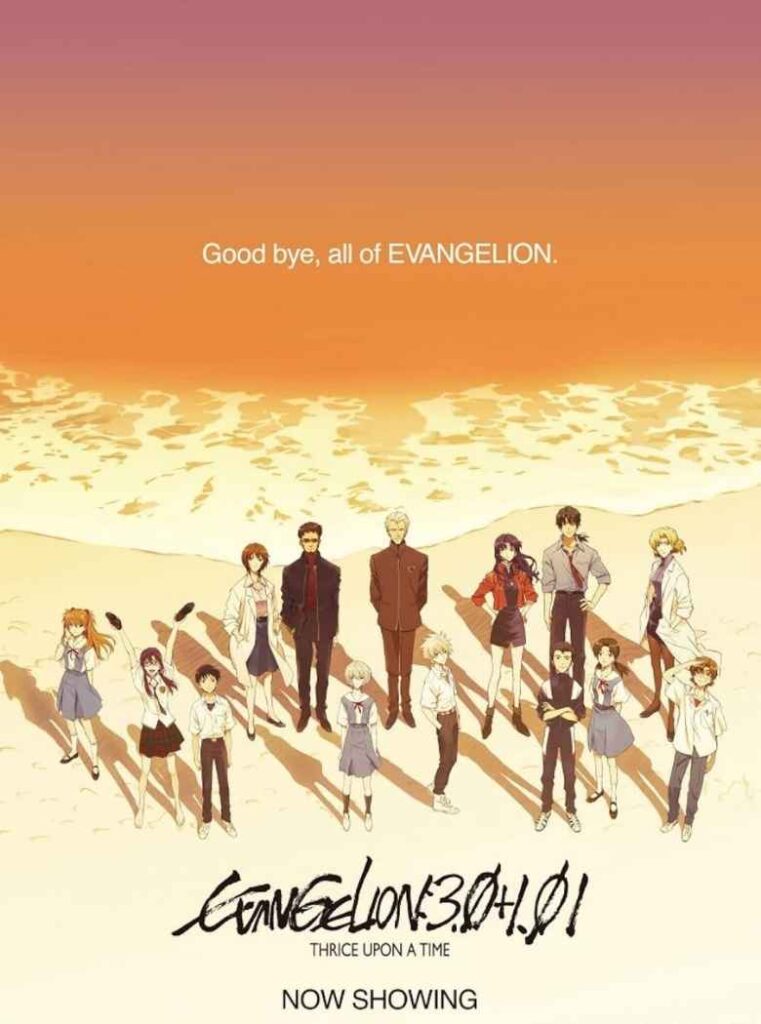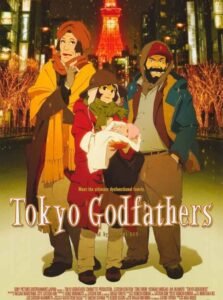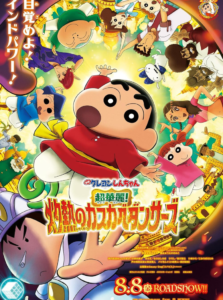Evangelion: 3.0+1.01 Thrice Upon a Time” marks the grand conclusion to the Rebuild of Evangelion film series, bringing an end to Hideaki Anno’s legendary saga that has captivated audiences for decades. This final installment offers an emotional, visually stunning, and deeply philosophical experience, giving fans closure to the story of Shinji Ikari and his struggle with self-acceptance, human connection, and the weight of past mistakes. The movie delivers breathtaking animation, intense action, and a narrative filled with intricate symbolism, making it a must-watch for both longtime fans and newcomers.

Movie Details
| Title | Evangelion: 3.0+1.01 Thrice Upon a Time |
|---|---|
| Director | Hideaki Anno |
| Studio | Studio Khara |
| Release Date | March 8, 2021 (Japan) |
| Runtime | 155 minutes |
| Genre | Mecha, Psychological, Sci-Fi, Drama |
| Language | Japanese |
| IMDb Rating | 8./10 |
| Review Count | 16,000+ |
| IMDb Link | IMDb |
Movie Explanation
Following the devastating events of Evangelion: 3.0 You Can (Not) Redo, Shinji, Asuka, and Rei wander through a post-apocalyptic wasteland, searching for purpose and survival. The world, now on the brink of complete collapse due to the catastrophic Fourth Impact, is barely holding together. They arrive at a small village where humans still persist, living their lives despite the encroaching doom. Here, Shinji witnesses a semblance of normality—people farming, helping each other, and continuing to live despite the looming shadow of destruction. This simple yet profound experience shakes Shinji to his core. Rei, who has always struggled with her sense of identity, begins to experience emotions for the first time. However, her existence is unstable, and she soon vanishes, reinforcing Shinji’s deep-rooted fear of loss.
Meanwhile, NERV, under the command of Gendo Ikari, pushes forward with his ultimate plan—to transcend human existence and reunite with his deceased wife, Yui. Wille, the rebel organization led by Misato Katsuragi, prepares for one last stand against NERV, determined to put an end to the madness. Shinji, once paralyzed by regret and self-loathing, finds himself at a crossroads. He realizes that running away from pain and responsibility will never bring him peace.
The final battle erupts in a surreal, reality-bending conflict between Wille and NERV, with giant Evangelions clashing in space and time itself warping as Gendo forces the world towards Instrumentality. As Shinji steps into the Evangelion once more, he confronts his father in a climactic showdown—not just of physical might, but of ideology and emotion. Gendo, who has spent his life chasing a future where he can be reunited with Yui, reveals his true loneliness and inability to connect with others. Shinji, however, chooses a different path.
Through an emotionally charged sequence, Shinji deconstructs the Evangelion universe itself, rejecting the cycle of suffering and despair. He chooses a world without Evangelions—a world where people can move forward without the burdens of the past. As reality resets, the once-destroyed world is restored, and Shinji finds himself in a peaceful place, free from the torment that once consumed him. In the final moments, he stands on a train platform, stepping into a future where he is no longer shackled by fear and regret.
Cast
- Shinji Ikari – Megumi Ogata
- Asuka Langley Shikinami – Yūko Miyamura
- Rei Ayanami – Megumi Hayashibara
- Misato Katsuragi – Kotono Mitsuishi
- Gendo Ikari – Fumihiko Tachiki
- Mari Illustrious Makinami – Maaya Sakamoto
- Ritsuko Akagi – Yuriko Yamaguchi
My Honest Review
As the final chapter of one of the most iconic anime franchises in history, Evangelion: 3.0+1.01 Thrice Upon a Time delivers a powerful and emotional conclusion. The film is a visual masterpiece, blending jaw-dropping action with quiet, introspective moments that explore the depths of human emotions. The animation is fluid and detailed, capturing both the chaos of battle and the subtle expressions of the characters with breathtaking precision.
One of the most impactful aspects of the movie is Shinji’s character development. Throughout the Evangelion series, he has been a deeply flawed protagonist, often consumed by self-doubt and hesitation. However, this film allows him to break free from his past, showing remarkable growth and maturity. The confrontation between Shinji and Gendo is one of the most emotionally charged moments in the entire franchise, providing insight into the motivations of both characters and ultimately delivering a satisfying resolution.
While the film is complex and layered with symbolism, it manages to convey a hopeful message—one that speaks to the importance of acceptance, moving forward, and embracing life despite its hardships. It may not answer every question posed by the Evangelion series, but it does what matters most: it brings closure.
What the Movie Teaches Us
At its core, Evangelion: 3.0+1.01 Thrice Upon a Time is about growth, acceptance, and finding meaning in life. It explores themes of loneliness, trauma, and the struggle to connect with others. Shinji’s journey from self-loathing to self-acceptance serves as a reminder that no matter how much we may feel trapped by our past, change is always possible.
The film also delivers a powerful message about breaking free from cycles of pain. Both Gendo and Shinji have suffered immensely, but while Gendo remains consumed by his grief, Shinji chooses to let go and move forward. This contrast highlights the importance of facing one’s emotions rather than suppressing them.
Ultimately, the movie teaches us that life is worth living—not because it’s easy or perfect, but because of the moments of connection, understanding, and hope that make it meaningful.
Trailer
FAQ
Q: Do I need to watch the original Neon Genesis Evangelion series before watching this movie?
A: While the Rebuild of Evangelion films take a different approach to the story, having prior knowledge of the original series enhances the experience. However, newcomers can still enjoy the movie by watching the previous Rebuild films.
Q: What is the significance of the ending?
A: The ending symbolizes Shinji’s growth and the decision to move forward in a world free from Evangelions. It represents hope and the idea that people can change, no matter how much they have suffered.
Q: Is this the definitive end of Evangelion?
A: Yes, Hideaki Anno has confirmed that this is the conclusion of the Evangelion saga, offering closure to the story that began decades ago.
Q: Why is the movie so emotionally intense?
A: Evangelion has always been a deeply psychological series, exploring trauma, depression, and existential themes. This final film brings those elements to a climax, making it an emotional journey for both characters and viewers.
Q: Where can I watch Evangelion: 3.0+1.01 Thrice Upon a Time?
A: The movie is available on Amazon Prime Video and select streaming platforms.











